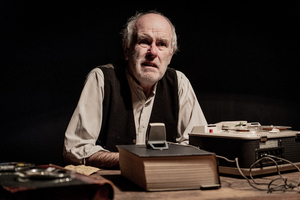Review: BECKETT TRIPLE BILL, Jermyn Street Theatre

![]() When even a single play by Samuel Beckett might become a test of endurance for an audience, putting three of them together risks missing the mark.
When even a single play by Samuel Beckett might become a test of endurance for an audience, putting three of them together risks missing the mark.
But as Trevor Nunn's superb Beckett Triple Bill at Jermyn Street Theatre confirms, it's a risk worth taking, and the results might be astounding. This potent line-up of three Beckett one-acts about memory and old age allows each play to clarify and enrich the other two, giving rise to an evening that is gloriously bigger than the sum of its parts.
First up is the well-known Krapp's Last Tape, first produced in 1958, which depicts the 69-year-old Krapp as he listens to - and is irked and moved by - a tape he recorded when he was 39. James Hayes is pitch-perfect as the curmudgeonly Krapp, his wonderfully expressive face embodying a drama of profound retrospection. His animalistic shrieks, grieving stares, and spasmodic twitches create the layered snapshot of a man for whom the past is both a source of anxiety and a place of refuge.
As he hears his younger self's pompous philosophising about life, Krapp's aggressive cringing betrays something between irritation and despair. The moment at which he embraces the tape recorder with unwitting tenderness is one of shocking beauty. One can't help but feel that nearly the whole scope of human self-consciousness is laid bare in this sharp shock of a play.
The follow-up to this is Eh Joe, originally a piece for television from 1965. Niall Buggy plays the titular character, who remains motionless and seated on a bed, intently listening to the haunting speech of an off-stage woman who may or may not be a former lover.
Lisa Dwan's seething, serpentine voice prods Buggy's unblinking face with sharp darts that know where to land in his mind. Almost paralysed by the insinuations and reminders of this address, Joe appears to be sorting through feelings of guilt and regret. But is he, really? There's no easy to way to tell, but the whole thing feels a like a calm nightmare - opaque yet disconcerting.
The third and final piece in this sequence of remembrances is The Old Tune, Beckett's 1963 adaptation of Robert Pinget's radio play La Manivelle. With hints of Waiting for Godot, the play portrays a chance encounter between Gorman (Niall Buggy) and Cream (David Threlfal), two elderly acquaintances who have clearly not seen each other for a long time.
The men sit on a street bench and ease themselves into a sympathetic chat that keeps unearthing the past in all its messiness. What they catch up on ranges from the tragic to the humorous, with the pair displaying a shared discomfort with the double threats of death and modernity. Both Buddy and Threlfal deliver impeccable performances that differentiate the two men through minuscule details and find great humanity in even their most fleeting gestures.
Nunn directs this triad of memory plays with commanding elegance, bringing out the best in his actors and relishing Beckett's intricate stage directions. Louie Whitemore's necessarily simple sets foreground the performances, and Max Pappenheim's well-textured sound design consistently enhances the onstage action. These are excellent renderings of three gnomic, haunting plays that brood over what the passage of time gives us and takes away from us. You would be hard-pressed to find better productions of them anytime soon.
Beckett Triple Bill at Jermyn Street Theatre until 8 February
Photo credit: Robert Workman
Add Your Comment
Videos

